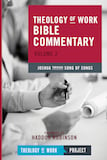David’s Rape of Bathsheba and Murder of Uriah (2 Samuel 11-12)
Bible Commentary / Produced by TOW Project
People in power have been covering up instances of sexual abuse for millennia, but the Bible boldly exposes examples of abuse against Sarah, Hagar, Dinah, two Tamars, and Bathsheba, the subject of this passage. The abuse of Bathsheba seems the most shocking of all because it comes at the hands of none other than Jesus’ most famous ancestor, King David. The story is ancient, but the issue remains as timely as ever. In recent years a wave of sexual abuse stories spawned a #metoo movement that toppled titans from the realms of entertainment (Harvey Weinstein, Bill O’Reilly, Charlie Rose), politics (Al Franken, Patrick Meehan, John Conyers), business (Steve Wynn, Travis Kalanick), sports (Larry Nassar), music (R. Kelly), and religion (Bill Hybels, Andy Savage, Paige Patterson). These names are from the USA, but the problem is worldwide.
The story is a familiar one. From his rooftop, David notices his attractive neighbor, Bathsheba, washing. He sends his men to take her back to the palace, he has sex with her, and she conceives. In an attempt to cover up the pregnancy, David recalls Bathsheba’s husband Uriah from the siege of Rabbah, but Uriah has too much integrity to sleep with his wife while the rest of the army and the ark are camping in tents. After David orchestrates Uriah’s death in battle, he assumes the disaster has been averted. But David doesn’t take God into account.
Over the course of history, this encounter between David and Bathsheba has often been described as adultery, which implies mutual consent. However, as we examine the details, we see that it is actually sexual abuse of power, in other words, rape. Neither the text nor the context supports the conclusion that it was an affair between two consenting adults. People who think Bathsheba seduced David by bathing outside his window may not realize the Hebrew verb rachats, used for Bathsheba’s action here (2 Samuel 11:2), literally means “wash” which is how it is translated elsewhere in this narrative (2 Sam. 11:8; 12:20). There is no reason to assume that Bathsheba was naked, or that she was aware that the king, who should have been with his army, would have been watching from his rooftop like a peeping Tom (2 Sam. 11:1-2).
People who think that she agreed to come to the palace willingly do not understand that when an ancient ruler summoned a subject to the palace, the subject had no choice but to comply. (See Esther 2:14, 3:12, and 8:9 for example.) And David sends not one, but several messengers, to ensure Bathsheba’s compliance (2 Sam. 11:4). Remember, the only person who refuses to follow David’s directives in this story, Uriah, is killed (2 Sam. 11:14-18). The text does not say that Bathsheba realized she was being brought to the palace for sex with the king. More likely, she would have assumed she was summoned there to be informed of her husband’s death, which is essentially what happened later (2 Sam. 11:26-27).
The text states the action as a one-way perpetration by David. “He lay with her,” not “they lay together” (2 Sam. 11:4). The language used here to describe their encounter suggests rape, not adultery. David “took” (laqach) Bathsheba and “lay” (shakav) with her. The verb shakav can mean merely sexual intercourse, but it is used in most of the rape incidents in the Hebrew Bible. The verbs laqach and shakav only appear together in contexts of rape (Genesis 34:2; 2 Sam. 12:11; 16:22).
We cannot blame Bathsheba for acquiescing when conveyed into the chamber of a man possessing great power and a history of violence. As the narrative continues, every person reproaches David, and none Bathsheba. God blames David. “The thing that David had done displeased the Lord” (2 Sam. 11:27). The prophet Nathan indicts David by telling a parable in which a rich man (representing David) “takes” a precious sheep (Bathsheba) from a poor man (Uriah). After hearing Nathan’s parable, even David blames David. “The man who has done this deserves to die” (2 Sam. 12:5). Just in case it wasn’t already clear, Nathan responds, “You are the man!” (2 Sam. 12:7). According to the rape and adultery laws of Deuteronomy 22:22-29, if only the man deserves to die, what took place was not adultery, but rape.
When we call this incident adultery or impugn Bathsheba’s actions, we are not only ignoring the text, but we are essentially blaming the victim. However, when we call it rape and focus on David’s actions, we not only take the text seriously, but we validate the stories of other victims of sexual abuse. Just as God saw what David did to Bathsheba, so God sees what perpetrators do to sexual abuse victims today.
David’s crime was an abuse of power carried out in the form of sexual violation. As sovereign over Israel’s largest empire, David had arguably more power than any other Israelite in the Old Testament. Before David took the throne, he used his power to serve others, perhaps most notably the defenseless cities of Keilah and Ziklag (1 Samuel 23:1-14; 30:1-31), but with Bathsheba he abused his power first to serve his lust, and then to preserve his reputation.
While few of us have as much authority as David did, many of us have power in smaller spheres in family or work contexts, either as a result of our sex, race, position, wealth or other status markers or simply as we get older, gain experience, and have more responsibility. It is tempting to take advantage of our power and privilege, thinking that we have worked hard for these perks (better offices, special parking spaces, higher salaries), even though people with less power don’t share them.
Conversely, many of us are vulnerable to those in power for the same reasons, although on the opposite side of the power distribution. It may be tempting to think that those in vulnerable positions ought to try to defend themselves, as many have thought with regard to Bathsheba. The text presents no evidence that she attempted to refuse David’s sexual imposition, therefore—as this kind of thinking goes—she must have been a willing participant. As we have seen, the Bible rejects this kind of thinking. The victim of a crime is always the victim of the crime, no matter how much or little resistance he or she may have attempted.
David plunged himself into this crime after he forgot that God gave him his position of power, and that God cared about what he did with it. Shepherds were meant to care for, not eat, the sheep in their herd (Ezekiel 34). Jesus, the good shepherd, used his power to feed, serve, heal, and bless people under his authority, and he commanded his followers to do the same (Mark 9:35; 10:42-45).
David’s sovereign power allowed him to avoid unpleasant aspects of his responsibility, specifically leading his army in war, even though he was a military hero, defeating Goliath and “thousands” in battle (1 Sam. 17; 18:7; 21:11; 29:5). A consequence of his decision to stay home and nap was that he had little accountability, since his closest friends (his “mighty men”) were out fighting. There were many people who know what David was doing, but they were servants, and, not surprisingly, none of them spoke out. People who confront power typically pay costs.
But that hadn't stopped Abigail, wise wife of foolish Nabal, from putting herself in harm’s way to prevent not-yet-ruler David from going on a bloody rampage (1 Sam. 25). If one of David’s servants had spoken an early word of warning like Abigail did, perhaps the rape of Bathsheba and murder of Uriah could have been avoided. After the crimes were committed, the prophet Nathan was prompted by God to confront the king, who fortunately for his soul listened to the message (2 Sam. 12). Notice that Abigail and Nathan were not themselves the intended victims of David’s power abuses. They were in positions of lower power than the perpetrator, yet somehow recognized that they might be in a position to intervene and were willing to take the risk to do so. Do their actions suggest that those of us who are aware of abuse have a responsibility to prevent or report it, even if doing so poses a risk to us or our reputations?
Most of us aren’t in situations where confronting a boss or supervisor involves risking our life, but speaking up in these types of contexts can mean losing status, a promotion, or a job. But as this story, and many others like it in Scripture illustrate, God calls his people to act as prophets in our churches, schools, businesses, and wherever we work and live. The examples of Abigail and Nathan—in addition to Jesus’s instructions in Matthew 18:15-17—suggest that ideally we should speak up face-to-face with the perpetrator. (However, Romans 13:1-7 implies Christians may use other means of due process that don’t require one-on-one confrontation with the abuser.)
For those of us who are conflict avoidant, learning to speak truth to people in authority can be developed gradually over time, like doing physical therapy for a weak or injured muscle. We cultivate the ability to confront by starting with small steps, asking questions or pointing out minor problems. We can then move to more significant issues by offering alternative perspectives that may not be popular. Over time, we can grow to be more courageous so that if we are aware of a significant moral failure like sexual abuse by a colleague or a superior, we can hopefully speak truth in a wise and gracious manner. On the other side of the equation, wise leaders make it easy for their subordinates to hold them accountable and raise issues. When you function as a leader, what do you do to welcome or solicit negative feedback from others?
David accepts Nathan’s severe negative feedback, and he repents. Even so, Nathan points out to David that his individual repentance and forgiveness does not by itself bring an end to the consequences David’s sin will have on others:
David said to Nathan, “I have sinned against the Lord.”
Nathan said to David, “Now the Lord has put away your sin; you shall not die. Nevertheless, because by this deed you have utterly scorned the Lord, the child that is born to you shall die” (2 Sam. 12:13-14).
David, though personally repentant, does not eradicate the culture of exploitation in place under his leadership. Nathan declares to David that the punishment for his sin will be severe, and the remainder of David’s reign is characterized by turmoil (2 Sam. 13-21, 1 Kings 1). In fact, David’s son Ammon commits the same crime (rape), but in an even more reprehensible manner, against his own sister Tamar (2 Sam. 13:1-19). David himself is complicit, though perhaps unknowingly. Even when it is brought to his attention, David does nothing to bring justice to the situation. Finally, David’s son, Absalom, decides to take action on his own. He kills Ammon and starts a war within David’s own household (2 Sam. 13), which escalates to civil war and a cascade of tragedy throughout Israel.
A culture that tolerates abuse is very hard to eradicate, much harder than its leaders suppose. If David thought that his personal repentance was all it would take to restore his household’s integrity, he was tragically mistaken. Sadly, this kind of complacency and willing disregard in tolerating a culture of abuse continues to the present day. How many churches, corporations, universities, governments and organizations have promised to root out a culture of sexual abuse after an incident is exposed, only to fall back immediately into the same old ways and to perpetrate even further abuses?
This episode does not end in despair, however. Sexual abuse is one of the most grievous of sins, yet even so there is the hope of justice and restoration. Can we let David, Nathan and Bathsheba’s examples embolden us to admit and repent (if we are the perpetrator), to confront (if we are aware of the crime), or to recover (if we are the victim)? In any case the first step is to make the abuse stop. Only when this occurs can we speak of repentance, including accepting guilt, punishment, and if possible, restitution. In the lineage of David’s most famous descendent, Jesus, Matthew reminds us of David’s rape. Matthew includes Bathsheba among the four mothers he mentions, not calling her the wife of David, but the wife of Uriah, the man David murdered (Matthew 1:6). This notice, at the beginning of the gospels, reminds us that God is a God both of justice and of restoration. In this one facet, we may in fact see David as a model worth emulating. This man of power, when faced with evidence of his own wrongdoing, repents and calls for justice, even though he knows it may well lead to his ruin. He does receive mercy, but not through his own power nor the power of his cronies, but by submitting to an authority beyond his power to manipulate.














